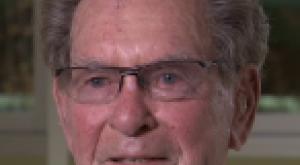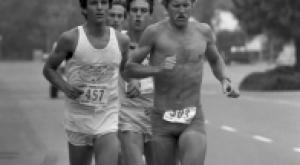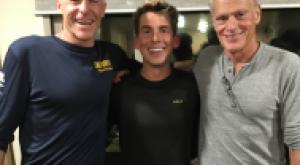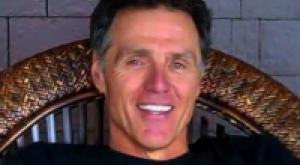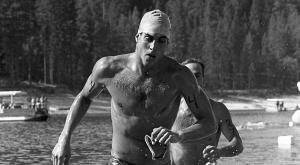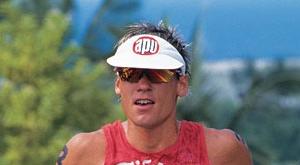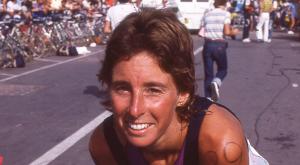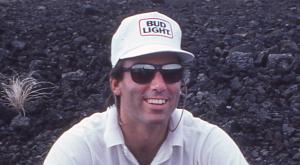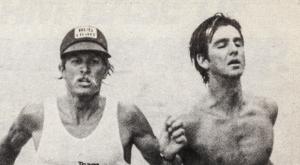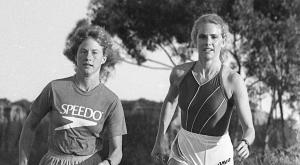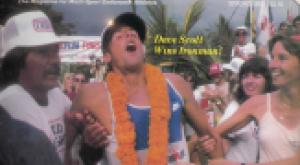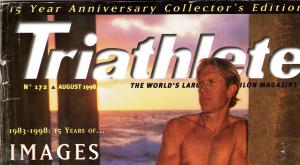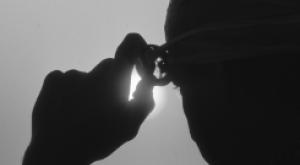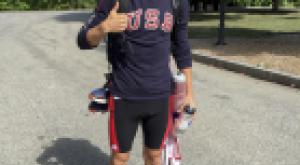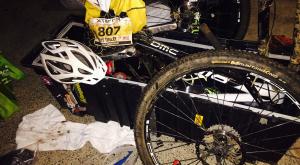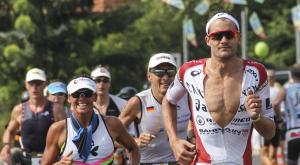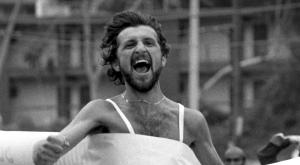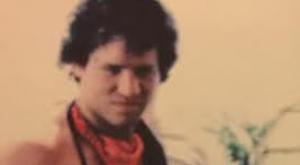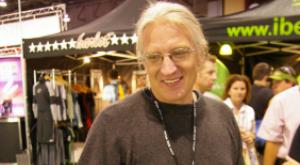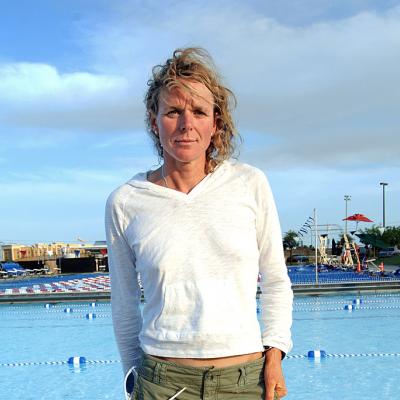
Nina Kraft in Clermont, Florida. "I want it to be like 2001, and have fun. I want to let go of what people are thinking."
A somewhat shorter version of this story originally appeared in Inside Triathlon magazine in 2007 - Ed.
After she made a disastrous choice to take EPO in 2004, after she disgraced herself on the sport's most sacred stage, after all her nobler rivals deplored her act and the triathletes in her country shunned her like a leper, and after she shook with guilt for the shame she had brought on her loving family – Nina Kraft looked back on more innocent days when her frequent smiles were returned.
Not that long before, the crowds in Kona had smiled and cheered for a shy young woman from Braunschweig, Germany, who challenged the sport's establishment and dared to knock on the door of Ironman greatness. Without much wit other than the moronic rhyme and nod to the idea of Germans as robotic, someone gave Nina Kraft the nickname of "Nina the Machina"—and it stuck.
With a strong swim and bike, Kraft scored a third in 2001, second in 2002 and another third place in 2003. Each year Kraft was run down by Natascha Badmann on the bike and Lori Bowden on the run. Hidden by her rudimentary grasp of English—so different from the witty mastery of the international language of sport that had been shown by Germany's multisport male stars like Jürgen Zäck, Thomas Hellriegel and Normann Stadler—no one but Kraft's boyfriend/adviser, Martin Malleirer, knew how dark the sunny spotlight of triathlon had become for her after she neared the Everest of the sport.
Innocence on the way up, then big pressure to succeed
To the age of 16, Kraft was a national-class swimmer, but as she neared adulthood, she was urged by her traditional upbringing to find a trade. So Kraft worked in mechanical drawing for a small German company. Relieved of her ascetic devotion to swimming, she started to enjoy herself with her friends, and for fun, they started to run. In 1997, Kraft did her first triathlon as an age grouper. The next year, she managed to finish 50th at Ironman Hawaii, and her company gave her the year off to see if she could make a living at the sport.
Kraft looks back wistfully on her days as an amateur. "Back then, if I want to go on a bike, I go with my friends and after we drink a bottle of wine and have fun," she recalls.
If it could be said that any triathlete of such great physical talent was so temperamentally unsuitable to handle fame, it was Nina Kraft. After a second-place in a time of 9:29 at Ironman Roth in 1999, Kraft turned pro. She continued to rise in the sport with a 16th at Ironman Hawaii in 2000, and in 2001 she won Ironman South Africa and placed third at Hawaii. "While Natasha catch me on the bike, and Lori catch me on the run, I was so happy," says Kraft of that breakthrough at Kona. "When she passed me, I told Lori, 'Go, go go!' We were both happy."
Then, says Kraft, "a lot changed." Before that moment, she said, "No one expected anything. But next year, people are expecting me to be winning. I have not been in school for 15 years, and I know little English, but now I go to press conference and I must speak English. Things happen fast and I feel pressure, pressure pressure."
Excuses don't have hands and feet
But Swiss superstar Natascha Badmann rejected Kraft's excuse of pressure as justification to take the banned performance enhancing drugs. EPO, or erythropoietin, is a naturally occurring hormone which stimulates the production of red blood cells, which transport oxygen to the muscles. A synthetic version of EPO was developed to treat medical conditions such as anemia in cancer patients and is banned for competition.
"The excuses don't have hands and feet," said Badmann to Ironmanlive.com in late October 2004. "We all have pressure in our lives and you have to learn to handle it."
While Badmann's words on responsibility are true, Kraft's whole view of the world was unhinged and twisted by her dread of high expectations. "When my sponsors tell me, 'Good luck, you will win,' they put so much pressure on me," says Kraft. "Pressure, pressure, pressure."
They're not being fair, why should I?
In 2002, Kraft took second to Badmann at Kona. In 2003, Kraft was leading Hawaii when Bowden swept past her on the run and Badmann won an ensuing duel for second by just eight seconds. In both races, Kraft incurred crucial drafting penalties. "I worked so hard and worked with my heart," said Kraft, who felt sorry for herself. "Always, I was riding all alone in the winds. And when I got a penalty, it broke my heart." Her adviser, Malleirer, has another take on her drafting problems. "Inside her, she thought they had something against the Germans," says Malleirer. "She said, 'They don't want that I win.'"
In 2004, Kraft won Ironman Germany in Frankfurt, breaking the nine-hour barrier and dominating the race, but she still felt insecure and paranoid coming into Kona. "The first time I got a penalty in Hawaii, I was OK," says Kraft. "But after a second and third time, I think, 'In other races I never get a penalty—only in Hawaii.' I know now what I did was not the right way. But I was thinking "They were not being fair -- so why should I?'"
Kraft and Malleirer said they found a source before the 2004 Ironman Hawaii and started a program of EPO for the first time to prepare for that specific event. However, many Ironman competitors suspect that Kraft was using EPO long before she was caught in a post-race drug test after Ironman Hawaii in 2004.
When she arrived in Kona before the 2004 event, three-time Ironman champion Peter Reid, who says he got along well with Kraft and Malleirer, wrote in his web blog that he was amazed at how buff Kraft looked. "I have never seen Nina this ripped," penned Reid in his blog before the race. "She looks scary. No one is going to beat her." Afterward, says Reid, "I wasn't shocked. I thought the signs were there before the race. She just looked like a killing machine."
On race day, it was almost embarrassing how far Kraft managed to lead then four-time champion Badmann, despite incurring yet another drafting penalty. She had a 10-minute lead when she received a red slash on her race number requiring another stint in the sin bin. "At first, I wanted to give up," recalls Kraft. But when Malleirer saw her slow down, he urged her to go on. Kraft hit T2 with a 17-minute lead, such an impressive margin that Badmann, then 36, asked her coach, Toni Hasler, "Am I too old?"
Kraft kept her margin and hit the finish line 17 minutes in front. When she crossed the finish line, she looked down and hung her head. When her post-race drug test came up positive for artificial EPO, Kraft waited a night, then called World Triathlon Corporation president Ben Fertic the next morning to tell him not to test her B sample. Kraft says she told Fertic, "Ben, it is true. I have done it."
The sport reacts
Compared to the dark clouds of drug positives flooding triathlon's sister sports of professional cycling and track and field, triathlon and its infrequent drug positives had wrapped its practitioners in a bubble of naiveté. So when this shocking news hit, the outraged reactions were magnified. "I feel disgusted about the news of Nina," wrote two-time Ironman Hawaii champion Lori Bowden on her website. "I am sure her sponsors would have rather seen her do her best than cheat to win. She has ruined her reputation, past victories and sacrificed her integrity, family, supporters and her own health just for the sake of winning a race."
Kraft's fellow German athletes felt the sting most acutely. Men's winner Normann Stadler told a German newspaper, "Nina Kraft caused heavy damage to the sport of triathlon worldwide and has hurt many people who believed in [triathlon]." Ironman Germany chief executive Kurt Denk banned Kraft for life from his race; Quelle Challenge Roth followed suit.
Kraft's quick admission, a rarity among drug cheats, gained her little credit among the majority of triathletes who noted that she and Malleirer refused to name their drug source. Many surmised that Kraft had been on the juice well before Hawaii, citing her 8:58 at Frankfurt that July. But despite the embarrassment of an NBC Ironman show in which Kraft took center stage and crossed the line with the winner's victory crown (her disgrace and DQ noted only in a footnote at the end of the show), the WTC's Fertic took note of Kraft's immediate admission of guilt and mea culpa and gave Kraft a two year ban. Most of Kraft's peers said that bans of four years, eight years or a lifetime, meted out to many of the era's track and field and cycling violators, would have been the more appropriate.
Kraft's website quickly published her admission of guilt and apology and left a fan forum open – for a while. But when threatening emails poured in, Malleirer shut it down. "Some people wrote in 'You must die,'" said Malleirer.
"I can't look in my father's eyes."
When Kraft and Malleirer were asked in 2006 what she lost by making this catastrophic decision, Malleirer said in tortured grammar, struggling with the painful memory of Kraft's depression, "How do you say she (wanted to) kill herself? Suicide. It was in this way she was in the hospital. (At the time) no one (in the public) knows this. And she cannot bear to look her family in the face. Especially her father. Everyone was so proud, but then this happens."
"It was the hardest part of my life I ever have," said Kraft later. Unable to say the words to describe her suicidal thoughts, she added in halting English, "And then I was (pause), what Martin is talking (about). After this, I can't look in my father's eyes."
Malleirer said Kraft's father was forgiving. "He said 'Nina, you are welcome here. What has happened, happened.' He is the family and was staying behind her."
But Kraft wasn't finished with her downward spiral. She left Malleirer. "We broke up at this time," she recalls. "I wanted to feel alone. So I went to New Zealand. And I was all the time thinking, alone. You lose all your friends. You lose all things. It was not as if you were a track person and you get help (from your federation.) I get no help. Nothing."
Kraft said she was spending days "lying on my back in bed and crying." One day she picked up a newspaper and read about disgraced cycling champion Marco Pantani's sad death of a cocaine overdose in a lonely hotel room. "I read how the people push Pantani so much after they know the bad things about him. He was sitting alone in the hotel at the end. He wanted help from the outside and nobody helped him. All the people were fighting him. And then after he died, so many people go to his grave and give him love."
Reading Il Pirata's sad story, Kraft hit the bottom of her well of anguish and pushed off toward life. "I changed my mind very fast after the article," she said in halting English. "It was something cleaning (for) me. I know I took the wrong way. I know some people are sad and they don't know what they are doing. So I wanted to show for them and all the people who make a bad mistake that they don't want to give up. They must go on."
The ban ends, but not the questions
After what the German magazines call her Dopingfallen (doping downfall), Kraft's DTU ban ended in November 12, 2005. The WTC ban continued for another year, so Kraft could only race independent events. Her U.S. comeback started with a fifth place – and an encouraging second fastest run split) at St. Anthony's Olympic distance in April 2006. In June, Kraft returned to Germany and won the Bocholter Aasee short course event in June and her home town race in Braunschweig in July. In August, she won the German half Iron distance championship in Kulmbach by 12 minutes. In September, Kraft took an impressive win at the challenging 4km swim, 120km bike, and 30km run triathlon in Gerardmer, France. There she beat soon-to-be 2006 ITU long course champion Bella Comerford. In January 2007 at Ironman Malaysia, Kraft got a taste of the bitter receptions still awaiting her. She explained "I was alone (in the lead on the bike) and thinking about the past two years and asking myself 'Why?' It was no fun to ride alone. So when Bella (Comerford) came closer, I was motivated again and built my lead on the run. But at 11k, I dropped out. Not because I bonked, but because there was this question in the back of my head 'Why?'"
Kraft later explained that she lost the still-fragile thread of her will when some spectators called her a drug cheat. "So I just stopped," said Kraft. "And (immediately) I regretted my decision."
In May, Kraft scored a second behind Leanda Cave at Tri One O One in Bradenton, then came back and won a tough duel with Dede Griesbauer to win Ironman Brazil – her sixth Ironman distance triumph. But after the race, Kraft and men's winner Oscar Galindez both missed the deadline to sign up for the Ironman Hawaii slots they had earned.
Afterward, Kraft showed signs that her surname, which means "strength" in German, was no longer an ironic comment on her failures of inner character. She uttered not one word of complaint in public. Nor did she fall into self-pity. In mid-August, Kraft will hit the starting line at Ironman Louisville with perhaps one women's pro slot for Ironman Hawaii available.
She still dreams of entering the waters at Kona to see what she can do. "I am not thinking of winning," said Kraft. "That is not my life. I know I have talent, but where I finish is not interesting any more. I want it to be like 2001, and have fun. I want to let go of what people are thinking and do not let the pressure (weigh) on my body."
******
Afterword
Nina Kraft returned to Kona in 2008, but it was only the partial fulfillment of her dream. She did not finish.
Today, a decade after her doping downfall at Kona, and long after the lifting of her ban from the sport, notations of Kraft's doping disgrace have gradually disappeared from stories written about her occasional excellent performances in triathlons. She lives and trains in Clermont, Florida, where people credit her generous reception there as an example of Americans' willingness to forgive anyone who sincerely expresses remorse for their action and lives a modest, decent life.
By contrast, many German triathletes remain unforgiving, as the stain of her sin cast a shadow on the arrival of so many great German Olympic and Ironman performers. Accordingly, she chooses to remain in exile from her home country, preferring the relative anonymity and friendliness she finds in a small Florida town.
Kraft, 45 years 7 months and 25 days old, won the 2014 edition of Ironman Louisville a week ago. In doing so, she became the oldest woman to win an official Ironman, eclipsing by some seven months the mark held by Natascha Badmann. Ironically, it was Badmann from whom Kraft stole the finishing honors at Ironman Hawaii in 2004, a debt never to be repaid despite Kraft's rapid DQ for her positive test for EPO and Badmann's official elevation to the win.
When I wrote in Slowtwitch about Kraft's record win in Louisville – and whose record she surpassed - the response was not favorable.
One reader commented: "Sorry Nina, the more you do things like this, the more people will rightfully ask questions."
Another wrote: "Too true. I am highly skeptical."
On the Slowtwitch Forum, others wrote that they thought she was still doping.
In a response to critical comments, I wrote: "While I appreciate the powerful sentiment to keep triathlon free of performance enhancing drugs, I think the harsh lack of forgiveness to those who have sincerely admitted their sin, served their suspension, and have conducted themselves with humility and sincere good faith for a decade since is one of the worst qualities of an otherwise generous and healthy sport."
I think the ultimate irony is that both Natascha Badmann and the woman who stole her Ironman Hawaii victory moment a decade ago both love the sport so much they are devoting their lives to it. They are training and performing at a professional level – Badmann far better - well past the time when regular human bodies cry out for and receive the relief of retirement. For Kraft, the atonement will never end.
******
Writer/photographer Timothy Carlson grew up in Daytona Beach, Florida. While attending Harvard College, he worked for the Harvard Crimson as a photographer and writer. As a freelance photographer and writer based in Cambridge, Mass his assignments included Palestinian refugees in Lebanon, a United Mine Workers Union strike in West Virginia, the Super Bowl, and the Daytona 500. He spent a decade working for the LA Herald Examiner, then four years at the Los Angeles Bureau of TV Guide. He's covered triathlon for Triathlete Magazine and Inside Triathlon. He is currently on the editorial staff of Slowtwitch.com.
With co-writer Bill Katovsky, Tim penned "Embedded: The Media at War in Ira"q, which won the 2004 Goldsmith Book Prize awarded by the Joan Shorenstein Center at the Kennedy School of Government at Harvard University.

